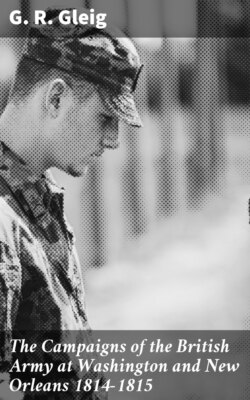Читать книгу The Campaigns of the British Army at Washington and New Orleans 1814-1815 - G. R. Gleig - Страница 9
На сайте Литреса книга снята с продажи.
MARCH THROUGH BAYONNE—TO ONDRES
ОглавлениеAs it would have been considerably out of our way to go round by the floating bridge*, permission was applied for and granted, to pass directly through Bayonne. With bayonets fixed, band playing, and colours flying, we accordingly marched along the streets of that city; a large proportion of the garrison being drawn up to receive us, and the windows crowded with spectators, male and female, eager to behold the troops from whom not long ago they had probably expected a visit of a very different nature. The scene was certainly remarkable enough, and the transition from animosity to good-will as singular as it was sudden; nor do I imagine that it would be easy to define the sensations of either party, on being thus strangely brought n contact with the other. The females, indeed, waved their handkerchiefs, whilst we bowed and kissed our hands; but I thought I could discover something like a suppressed scowl upon the countenances of the military. Certain it is, that in whatever light the new state of affairs might be regarded by the great bulk of the nation, with the army it was by no means popular; and at this period they appeared to consider the passage of British troops through their lines as the triumphal entrance of a victorious enemy.
_________________________
* The bridge here alluded to was thrown across the Adour by the
Duke of Wellington at the commencement of the siege. It was
composed of a number of small fishing vessels fastened together
with cords, and planked from one to another, the whole firmly
moored about three miles below Bayonne. Whether the
daringness of the attempt, or the difficulties surmounted in
its completion, be considered, the construction of this bridge
may be looked upon as one of the most extraordinary actions of
that extraordinary man.
—————————————
As soon as we had cleared the entrenchments of Bayonne, and got beyond the limits of the allied camps, we found ours in a country more peaceful and more picturesque than any we had yet traversed. There were here no signs of war or marks of violence. The cottages were covered with honeysuckle and roses, the gardens were blooming in the most perfect order; the corn was growing in great plenty and richness, and the vines were clustering round their poles like the hops in the gardens of Kent. It is impossible to describe the feeling of absolute refreshment which such a sight stirred up in men who, for so long a time, had looked upon nothing but ruin and devastation. It is true that with respect to grandeur, or even beauty, the scenery through which we now travelled was not to be compared with the sublime passes of the Pyrenees, or with many spots which we had beheld; but in truth, a hamlet uninjured and tenanted by its own rude peasantry, a field of Indian corn exhibiting no wasteful track of foragers, nay, a single cottage with its flowers and evergreens budding around it, was at this a more welcome object to our eyes than the wildest mountains or most romantic valleys displaying no habitations except white tents and no inhabitants except soldiers. For my own part I felt as if I had once more returned into the bosom of civilized and domestic life, after having been for many months a wanderer and a savage.
The road along which we proceeded had been made by Napoleon, and was remarkably good. It was sheltered, on each side, from the rays of the sun, by groves of cork-trees mingled with fir; by which means, though the day was overpoweringly hot, we did not suffer so much as we should otherwise have done. Our march was, therefore, exceedingly agreeable, and we came in, about noon, very little fatigued, to the village of Ondres, where the tents were pitched, and we remained till the morrow.
